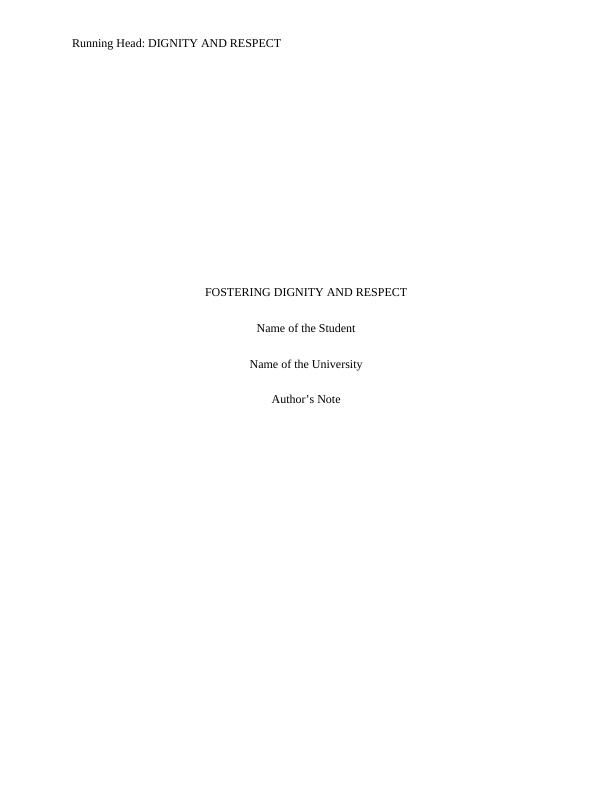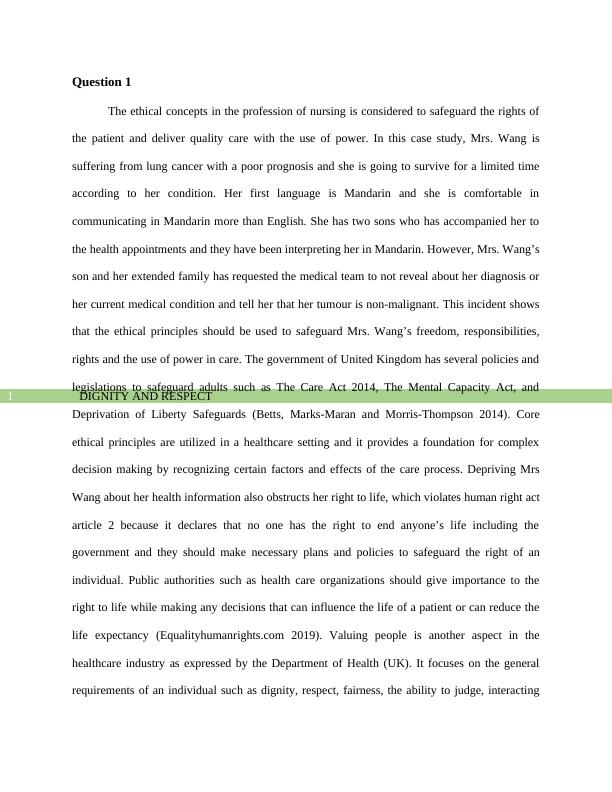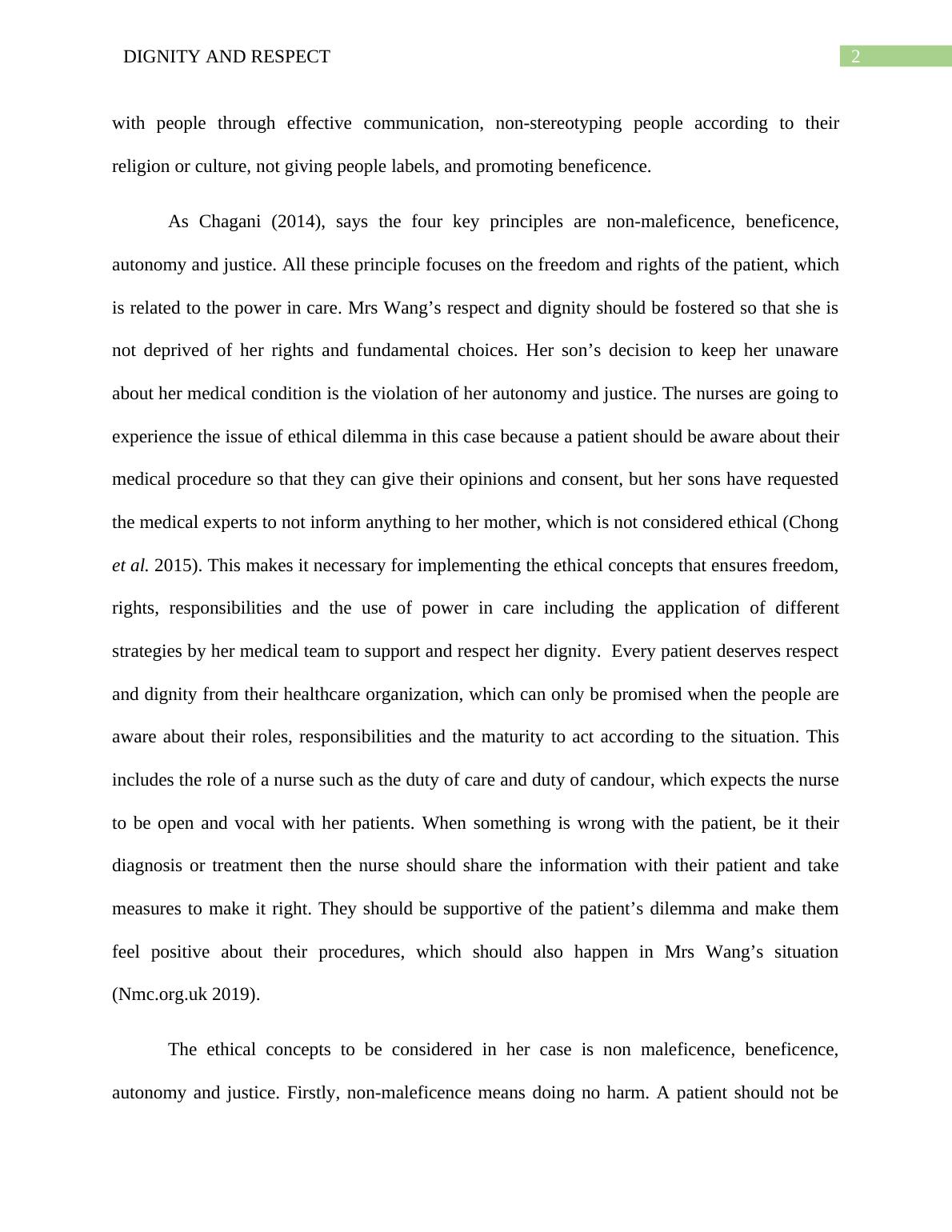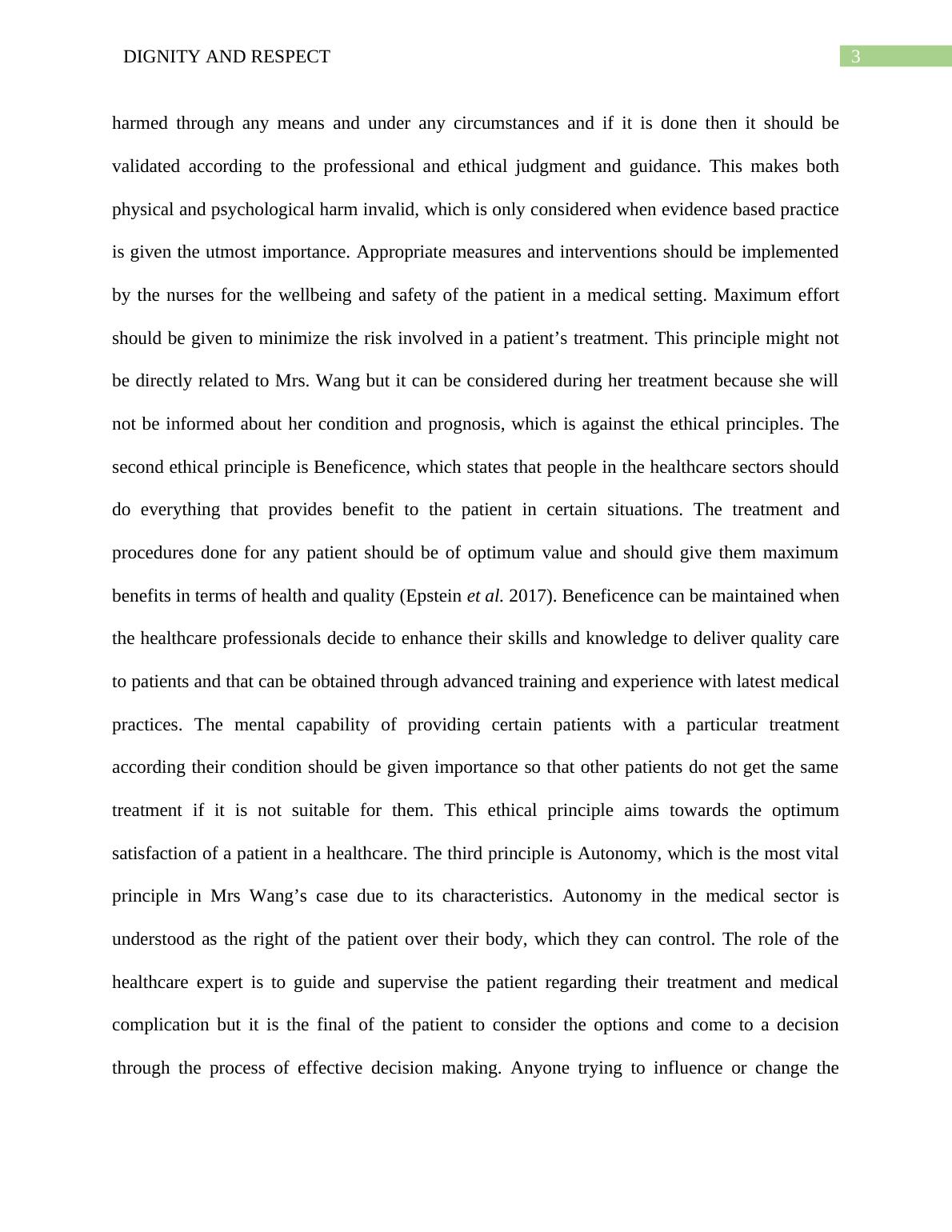Dignity and Respect Assignment
Added on 2022-08-18
13 Pages3916 Words19 Views
Running Head: DIGNITY AND RESPECT
FOSTERING DIGNITY AND RESPECT
Name of the Student
Name of the University
Author’s Note
FOSTERING DIGNITY AND RESPECT
Name of the Student
Name of the University
Author’s Note

DIGNITY AND RESPECT1
Question 1
The ethical concepts in the profession of nursing is considered to safeguard the rights of
the patient and deliver quality care with the use of power. In this case study, Mrs. Wang is
suffering from lung cancer with a poor prognosis and she is going to survive for a limited time
according to her condition. Her first language is Mandarin and she is comfortable in
communicating in Mandarin more than English. She has two sons who has accompanied her to
the health appointments and they have been interpreting her in Mandarin. However, Mrs. Wang’s
son and her extended family has requested the medical team to not reveal about her diagnosis or
her current medical condition and tell her that her tumour is non-malignant. This incident shows
that the ethical principles should be used to safeguard Mrs. Wang’s freedom, responsibilities,
rights and the use of power in care. The government of United Kingdom has several policies and
legislations to safeguard adults such as The Care Act 2014, The Mental Capacity Act, and
Deprivation of Liberty Safeguards (Betts, Marks-Maran and Morris-Thompson 2014). Core
ethical principles are utilized in a healthcare setting and it provides a foundation for complex
decision making by recognizing certain factors and effects of the care process. Depriving Mrs
Wang about her health information also obstructs her right to life, which violates human right act
article 2 because it declares that no one has the right to end anyone’s life including the
government and they should make necessary plans and policies to safeguard the right of an
individual. Public authorities such as health care organizations should give importance to the
right to life while making any decisions that can influence the life of a patient or can reduce the
life expectancy (Equalityhumanrights.com 2019). Valuing people is another aspect in the
healthcare industry as expressed by the Department of Health (UK). It focuses on the general
requirements of an individual such as dignity, respect, fairness, the ability to judge, interacting
Question 1
The ethical concepts in the profession of nursing is considered to safeguard the rights of
the patient and deliver quality care with the use of power. In this case study, Mrs. Wang is
suffering from lung cancer with a poor prognosis and she is going to survive for a limited time
according to her condition. Her first language is Mandarin and she is comfortable in
communicating in Mandarin more than English. She has two sons who has accompanied her to
the health appointments and they have been interpreting her in Mandarin. However, Mrs. Wang’s
son and her extended family has requested the medical team to not reveal about her diagnosis or
her current medical condition and tell her that her tumour is non-malignant. This incident shows
that the ethical principles should be used to safeguard Mrs. Wang’s freedom, responsibilities,
rights and the use of power in care. The government of United Kingdom has several policies and
legislations to safeguard adults such as The Care Act 2014, The Mental Capacity Act, and
Deprivation of Liberty Safeguards (Betts, Marks-Maran and Morris-Thompson 2014). Core
ethical principles are utilized in a healthcare setting and it provides a foundation for complex
decision making by recognizing certain factors and effects of the care process. Depriving Mrs
Wang about her health information also obstructs her right to life, which violates human right act
article 2 because it declares that no one has the right to end anyone’s life including the
government and they should make necessary plans and policies to safeguard the right of an
individual. Public authorities such as health care organizations should give importance to the
right to life while making any decisions that can influence the life of a patient or can reduce the
life expectancy (Equalityhumanrights.com 2019). Valuing people is another aspect in the
healthcare industry as expressed by the Department of Health (UK). It focuses on the general
requirements of an individual such as dignity, respect, fairness, the ability to judge, interacting

DIGNITY AND RESPECT2
with people through effective communication, non-stereotyping people according to their
religion or culture, not giving people labels, and promoting beneficence.
As Chagani (2014), says the four key principles are non-maleficence, beneficence,
autonomy and justice. All these principle focuses on the freedom and rights of the patient, which
is related to the power in care. Mrs Wang’s respect and dignity should be fostered so that she is
not deprived of her rights and fundamental choices. Her son’s decision to keep her unaware
about her medical condition is the violation of her autonomy and justice. The nurses are going to
experience the issue of ethical dilemma in this case because a patient should be aware about their
medical procedure so that they can give their opinions and consent, but her sons have requested
the medical experts to not inform anything to her mother, which is not considered ethical (Chong
et al. 2015). This makes it necessary for implementing the ethical concepts that ensures freedom,
rights, responsibilities and the use of power in care including the application of different
strategies by her medical team to support and respect her dignity. Every patient deserves respect
and dignity from their healthcare organization, which can only be promised when the people are
aware about their roles, responsibilities and the maturity to act according to the situation. This
includes the role of a nurse such as the duty of care and duty of candour, which expects the nurse
to be open and vocal with her patients. When something is wrong with the patient, be it their
diagnosis or treatment then the nurse should share the information with their patient and take
measures to make it right. They should be supportive of the patient’s dilemma and make them
feel positive about their procedures, which should also happen in Mrs Wang’s situation
(Nmc.org.uk 2019).
The ethical concepts to be considered in her case is non maleficence, beneficence,
autonomy and justice. Firstly, non-maleficence means doing no harm. A patient should not be
with people through effective communication, non-stereotyping people according to their
religion or culture, not giving people labels, and promoting beneficence.
As Chagani (2014), says the four key principles are non-maleficence, beneficence,
autonomy and justice. All these principle focuses on the freedom and rights of the patient, which
is related to the power in care. Mrs Wang’s respect and dignity should be fostered so that she is
not deprived of her rights and fundamental choices. Her son’s decision to keep her unaware
about her medical condition is the violation of her autonomy and justice. The nurses are going to
experience the issue of ethical dilemma in this case because a patient should be aware about their
medical procedure so that they can give their opinions and consent, but her sons have requested
the medical experts to not inform anything to her mother, which is not considered ethical (Chong
et al. 2015). This makes it necessary for implementing the ethical concepts that ensures freedom,
rights, responsibilities and the use of power in care including the application of different
strategies by her medical team to support and respect her dignity. Every patient deserves respect
and dignity from their healthcare organization, which can only be promised when the people are
aware about their roles, responsibilities and the maturity to act according to the situation. This
includes the role of a nurse such as the duty of care and duty of candour, which expects the nurse
to be open and vocal with her patients. When something is wrong with the patient, be it their
diagnosis or treatment then the nurse should share the information with their patient and take
measures to make it right. They should be supportive of the patient’s dilemma and make them
feel positive about their procedures, which should also happen in Mrs Wang’s situation
(Nmc.org.uk 2019).
The ethical concepts to be considered in her case is non maleficence, beneficence,
autonomy and justice. Firstly, non-maleficence means doing no harm. A patient should not be

DIGNITY AND RESPECT3
harmed through any means and under any circumstances and if it is done then it should be
validated according to the professional and ethical judgment and guidance. This makes both
physical and psychological harm invalid, which is only considered when evidence based practice
is given the utmost importance. Appropriate measures and interventions should be implemented
by the nurses for the wellbeing and safety of the patient in a medical setting. Maximum effort
should be given to minimize the risk involved in a patient’s treatment. This principle might not
be directly related to Mrs. Wang but it can be considered during her treatment because she will
not be informed about her condition and prognosis, which is against the ethical principles. The
second ethical principle is Beneficence, which states that people in the healthcare sectors should
do everything that provides benefit to the patient in certain situations. The treatment and
procedures done for any patient should be of optimum value and should give them maximum
benefits in terms of health and quality (Epstein et al. 2017). Beneficence can be maintained when
the healthcare professionals decide to enhance their skills and knowledge to deliver quality care
to patients and that can be obtained through advanced training and experience with latest medical
practices. The mental capability of providing certain patients with a particular treatment
according their condition should be given importance so that other patients do not get the same
treatment if it is not suitable for them. This ethical principle aims towards the optimum
satisfaction of a patient in a healthcare. The third principle is Autonomy, which is the most vital
principle in Mrs Wang’s case due to its characteristics. Autonomy in the medical sector is
understood as the right of the patient over their body, which they can control. The role of the
healthcare expert is to guide and supervise the patient regarding their treatment and medical
complication but it is the final of the patient to consider the options and come to a decision
through the process of effective decision making. Anyone trying to influence or change the
harmed through any means and under any circumstances and if it is done then it should be
validated according to the professional and ethical judgment and guidance. This makes both
physical and psychological harm invalid, which is only considered when evidence based practice
is given the utmost importance. Appropriate measures and interventions should be implemented
by the nurses for the wellbeing and safety of the patient in a medical setting. Maximum effort
should be given to minimize the risk involved in a patient’s treatment. This principle might not
be directly related to Mrs. Wang but it can be considered during her treatment because she will
not be informed about her condition and prognosis, which is against the ethical principles. The
second ethical principle is Beneficence, which states that people in the healthcare sectors should
do everything that provides benefit to the patient in certain situations. The treatment and
procedures done for any patient should be of optimum value and should give them maximum
benefits in terms of health and quality (Epstein et al. 2017). Beneficence can be maintained when
the healthcare professionals decide to enhance their skills and knowledge to deliver quality care
to patients and that can be obtained through advanced training and experience with latest medical
practices. The mental capability of providing certain patients with a particular treatment
according their condition should be given importance so that other patients do not get the same
treatment if it is not suitable for them. This ethical principle aims towards the optimum
satisfaction of a patient in a healthcare. The third principle is Autonomy, which is the most vital
principle in Mrs Wang’s case due to its characteristics. Autonomy in the medical sector is
understood as the right of the patient over their body, which they can control. The role of the
healthcare expert is to guide and supervise the patient regarding their treatment and medical
complication but it is the final of the patient to consider the options and come to a decision
through the process of effective decision making. Anyone trying to influence or change the

End of preview
Want to access all the pages? Upload your documents or become a member.
Related Documents
Fostering Dignity and Respect - Case Studylg...
|13
|4126
|16
Fostering Dignity and Respect in Healthcare: A Case Study of Mrs. Wang's Lung Cancer Treatmentlg...
|11
|3331
|67
Nursing Assignment | Situation Analysislg...
|14
|4082
|16
Fostering Dignity and Respect in Health and Social Carelg...
|12
|3986
|1
Dignity and Respect in Mrs. Wang's Situationlg...
|12
|3750
|3
Fostering Dignity and Respect in Healthcare: Ethical Concepts and Effective Communication Strategieslg...
|11
|3844
|213
